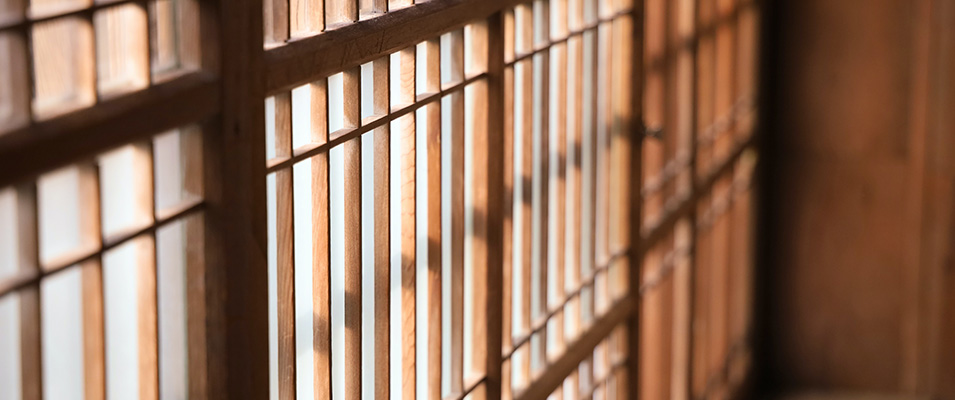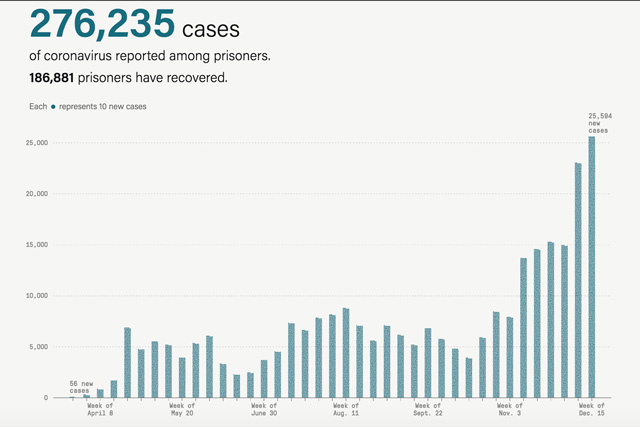(De an Sun on Unsplash)
By Ashley Castillo
COVID-19 has taken a brutal emotional toll on inmates in New York’s prisons because many pandemic precautions were not enforced, potentially exposing them to the virus. They live with fear of catching the virus from employees who are in contact with the outside world. In addition, physical visits are some times discontinued, further isolating residents.
As of December 24, 2764 staff, 2607 inmates and 168 parolees have had Covid-19 in the New York State prison system, according to the Department of Corrections and Community Supervision (DOCCS). During this time, says the DOCCS, six staff, 20 inmates and four parolees have died of the disease.
In testimony on the impact of COVID-19 on prisons and jails, the head of the New York State Correctional Officers and Police Benevolent Association asked the state legislature to address pandemic prevention measures. “During the initial stages of the pandemic, DOCCS was slow to take necessary safety precautions for everyone associated with the prison system,” said Michael Powers, who was himself stricken with Covid-19. “There was a total lack of personal protection equipment (PPE) for my members and those incarcerated.”
Joel, 29, was serving 12 months in a New York State prison for a drug charge. He was nearing the end of his sentence when the virus struck and, due to closures of various governmental offices, ended up serving two additional months. He describes abuse at the hands of a program meant to help inmates transition from prison to a halfway house. He said it seemed their attitude was that they were chosen by the Republican Party to teach inmates a lesson.
Correctional officers provoked inmates, says Joel, who described the precarious state he found himself while inside where he kept his head down, didn’t share with others, didn’t snitch, didn’t get into fights, didn’t disrespect, didn’t react, even if he was abused. “Your power to fight back was used against you and manipulated with your released date,” he said. “Along with other inmates you try to become antisocial so it doesn’t reflect your mental health, but not everyone in there is meant to be in there to become best friends and make friendship bracelets. You have to recognize the people you are surrounding yourself with.” It forced him to mature quickly and think carefully in situations that might cause him to react.
The situation was emotionally stressful, which was compounded by the need to social distance. Sometimes social distancing was practiced, other times inmates would be in groups as if the pandemic was not happening or never happened. Joel missed being able to have one visitor a day to and three phone calls throughout the week. His time inside also caused anxiety for his mother and the mother of his child. His mother was not informed by anyone on how he was doing or anything about to his health. His mother is a single mother to five children. Having Joel away impacted her emotionally. First she was just able to see him once a week and then it was one call a week. It made her think there could be a last time talking to her son.
It also took an emotional toll on the mother of his child. She had to take care of the home, the child. She lost her job. She didn’t know how to pay the bills and take care of herself and the child. Thus it was hard putting money into Joel’s account.
Due to the pandemic, Joel wasn’t able to leave once his 12 month sentence was up. Covid-19 slowed everything down. He had lost a neighborhood friend due to the virus and was increasingly anxious about his family’s health. Joel’s outlook on life is different after being in prison for 14 months. That, combined with the pandemic, made him realize how short life is. Joel felt he was a burden to his family, knowing they have to provide and put in the effort for his well-being when he was away. He’s well aware where his actions led him and would not recommend them. Instead, he hope to make wiser decisions for himself and his family.




